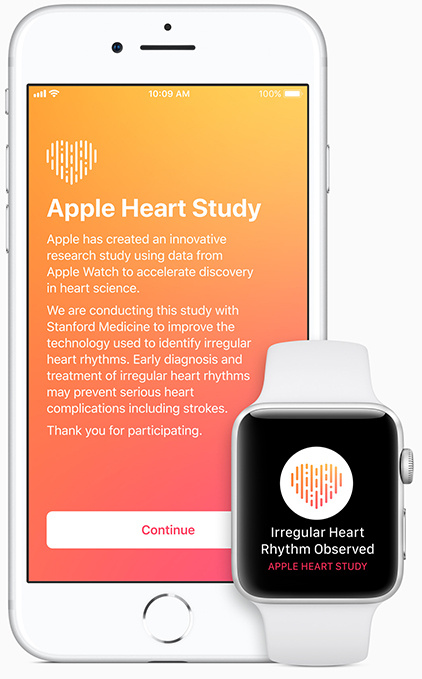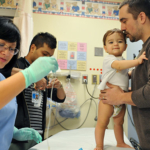KardiaBand for the Apple Watch records ECG, detects atrial fibrillation
Watching the rhythm of your heart is getting quite a bit easier. AliveCor, the originators of the to-go ECG smartphone market, have announced FDA clearance of the KardiaBand single-lead ECG device for the Apple Watch.

MedGadget November 30, 2017
The device is capable of detecting atrial fibrillation, a common heart rhythm disorder that’s difficult to diagnose, and because it’s always on the wrist of the user, readings can be done at any time. It costs $199, but to receive all the services, such as unlimited recordings, automatic atrial fibrillation detection, and sharing of readings, there’s also an annual $99 subscription.
It can record up to 30 seconds of an ECG, which can be easily shared with the doctor. If an arrhythmia is detected, and mind you that not all of them are, the Kardia App on the watch will let you know, so you’ll know to make sure to send that particular recording to the doc.

AliveCor now also has something called SmartRhythm, which is an algorithm that compares the user’s heart activity with the physical activity, as measured by the accelerometer and other sensors within the watch. When the two our don’t seem to match, there may be a serious underlying condition that perhaps should be checked into via a stress test and or other means.
“This is a paradigm shift for cardiac care as well as an important advance in healthcare,” in AliveCor’s announcement said Dr. Ronald P. Karlsberg MD FACC, of Cedars Sinai Heart Institute and UCLA’s medical school. “Today, EKGs are available only in offices and hospitals, using complex equipment, and usually only after a life threatening event, for example a stroke. With an EKG device on the wrist, AFib can be detected wherever the patient is, 24 hours a day. In randomized research trials, KardiaMobile, the first AliveCor EKG device, proved to be superior to routine care provided by physicians. Today, KardiaBand is a giant leap in personalized health care.”
| Taking an EKG is easy with KardiaBand from AliveCor. Youtube Nov 30, 2017 |
| Apple Heart Study launches: Anyone with Apple Watch can participate |

Scott Jung, MedGadget December 1, 2017
Apple has now officially launched its previously announced Apple Heart Study with the release of the Heart Study app. In partnership with Stanford University, the Apple Heart Study aims to see if the Apple Watch can accurately identify arrhythmias with its heart rate tracking technology and notify users of possible atrial fibrillation.
Unlike the gold standard electrocardiogram (ECG), which measures the electrical activity in your heart, Apple and most other consumer wearable companies use LED lights flashing hundreds of times per second and light-sensitive photodiodes to detect the amount of blood flowing through the wrist as an indicator of the heart’s activity. This method, while simpler to use, has been typically viewed as less accurate than ECG sensors, so the ability to detect potentially fatal arrhythmias would be a significant step for the overall health wearables market.
Users who are 22 years or older and own an Apple Watch series 1 or newer can download the app, which will periodically collect heart rate and rhythm samples throughout the day, depending on how active the user is. If an irregular heart rhythm is identified, participants will be alerted and will be offered a free phone or FaceTime consultation with a study doctor and also receive an ECG patch to wear for additional monitoring.
Click here to download the app and join the Apple Heart Study
Also see
AliveCor Introduces World’s First 6-Lead Consumer ECG, the KardiaMobile 6L Medgadget
Stanford Medicine to collaborate on Apple Heart Study Stanford Medicine
Apple Heart Study launches to identify irregular heart rhythms Apple Newsroom
Bridging the Gap Between Wearables and Healthcare AliveCor
Apple, Stanford launch Apple Heart Study to improve atrial fibrillation detection Mobi Health News
Center for Digital Health awards first seed grants, 1,000 Apple Watches to five teams Stanford Medicine
Smartphone Heart Monitor Beats Doctors at Diagnosing Atrial Fibrillation IEEE Spectrum
Apple Watch: The ‘Check Engine Light’ For Our Bodies American Council on Science and Health ACSH
Mobile Application Detecting Atrial Fibrillation Reduces the Risk of Stroke University of Turku
Using AI to detect heart disease University of Southern California






